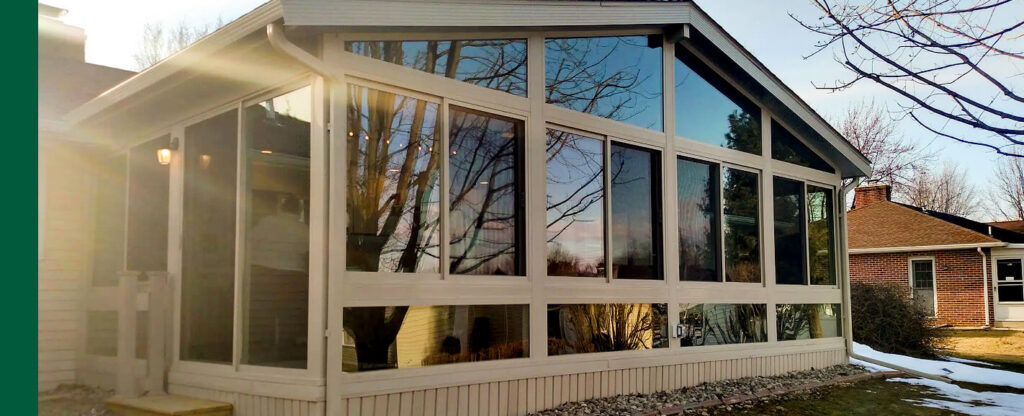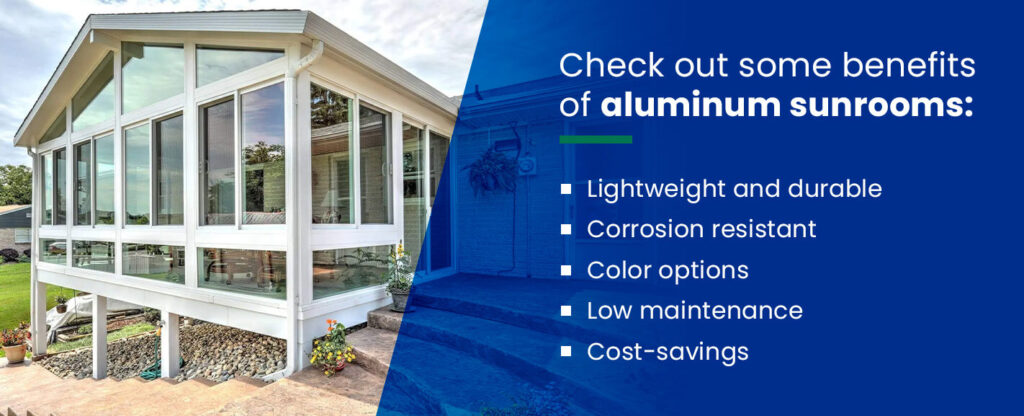
A sunroom is a functional addition to your home. Apart from offering a secluded haven where you can retreat and enjoy time alone, it can serve multiple purposes, depending on the type of sunroom you opt for. We’ve compiled a list of pros and cons of wood, aluminum and vinyl sunrooms to help you decide which is better for your home.
Benefits of a Sunroom
There are numerous advantages of having a sunroom. Here are a few of the main benefits you’ll enjoy:
- More fun in the sun: Glass construction allows light to enter the sunroom from all angles, so you can lounge and bask in the sun at leisure. Even on cooler days when sunlight is less abundant, you’ll receive ample natural light to enjoy. And during the colder months, there’s nothing quite like being surrounded by falling rain in the warmth and protection of a sunroom.
- More chances for napping and relaxing: A sunroom is built for comfort. Whether you’re soaking up the sun or falling asleep to the soft lull of rain, it is the perfect area to take a nap or relax and unwind with a book.
- Improved mood: The peace and zen a sunroom offers are likely to improve your mood, especially if you’re feeling stressed, tired or in need of some alone. It provides a sanctuary to escape from the hustle and bustle of life.
- Convert it into a hobby area: If you enjoy creative activities like painting, writing or scrapbooking, you can use your sunroom to indulge in your hobbies. They are versatile areas that provide enough room to accommodate these types of activities.
- Add solar panels: You can take advantage of the natural light provided by a sunroom and install solar panels on the roof to help reduce electricity bills. There are also many more ways to keep your sunroom at a comfortable temperature and make it more energy-efficient.
- Increase your home’s value: Home additions or upgrades can help your property value increase, making a sunroom an aesthetically pleasing and smart long-term investment.
Wood Sunrooms
First, we’ll take a look at the pros and cons of wood sunrooms. Consider the following advantages of installing a wood sunroom:
- Traditional look with customizable designs: Those seeking a traditional look with customization options might benefit from a wood sunroom.
- Strong and durable: Wood is tough enough to withstand extreme weather conditions.
- Good insulator: Wood is a natural insulator, so it can help keep the sunroom temperature regulated.
Keep in mind that wood sunrooms have some disadvantages:
- Susceptible to rot: Wood sunrooms are more prone to rot and damage from termites than other materials.
- High maintenance: A wood sunroom requires a lot of upkeep, including regular painting and refinishing, to maintain its luster and natural shine. This is especially true for people living in damp climates.
- Costly: Wood tends to be a costly building material, and installation costs may be higher as well due to its weight.
Aluminum Sunrooms

An aluminum sunroom offers many advantages for homeowners. Check out some benefits of aluminum sunrooms:
- Lightweight and durable: Aluminum is a lightweight yet extremely durable material that can withstand adverse weather conditions. Aluminum frames are manufactured to hold heavy, large windows in homes, making them perfect for the same application in sunrooms.
- Corrosion resistant: Aluminum resists corrosion, which makes it less prone to weather damage.
- Color options: When you choose an aluminum sunroom, you have many color options at your disposal.
- Low maintenance: You’ll spend little to no time and money maintaining aluminum — it’s easy to clean and maintain.
- Cost-savings: Aluminum sunrooms are less expensive to install than traditional options like wood.
While aluminum sunrooms come with plenty of advantages, there are some disadvantages to consider:
- Poor insulator: Aluminum is not the best insulator, so it won’t retain heat well to help regulate temperature. Fortunately, manufacturers have realized this and have started introducing thermal byproducts to promote better insulation.
- Prone to fading and scratching: If you’re close to the ocean and exposed to salty air, you may experience powder-coated aluminum frames fading or chalking up, but this usually takes years to occur. Aluminum is also more likely to sustain scratches and small dents.
Vinyl Sunrooms
Between aluminum and vinyl sunrooms, vinyl is often the preferred material option for its multitude of benefits. Consider the benefits of a vinyl sunroom:
- Great insulator: With vinyl, you can easily regulate the temperature of your sunroom. It keeps heat inside during the winter to help keep you warm. During the summer, it keeps the cool air from the AC inside. Regardless of the weather, you’ll enjoy the best of the season you’re in.
- Eco-friendly: A vinyl sunroom can help you save on electricity bills since energy from inside your home won’t escape. Spending less on electricity bills reduces your home’s carbon footprint and subsequent environmental impact. Plus, vinyl is often made of recyclable materials.
- Low maintenance: Vinyl is ideal for constructing a sunroom because it is less prone to fading, oxidizing and warping and can be cleaned fairly easily.
- Dent resistant: Any impact on vinyl won’t affect the structure and integrity of the framework because it retains its form. This dent-resistant material is especially beneficial during strong winds and storms.
- Color variety: With a vinyl sunroom, you’ll find an array of options that will suit your home and make it stand out.
- Affordable: Vinyl is the most affordable sunroom material.
- Durable: Vinyl is a lightweight yet extremely durable material. It’s often internally reinforced by aluminum or steel for enhanced strength.
Choose Garrety Glass for Your Sunroom Installation
When you consider aluminum vs. wood sunrooms and vinyl vs. wood sunrooms, you’ll see why aluminum and vinyl may be better options. What sunroom material to use depends on your preferences, location and budget — but when it comes to factors like maintenance, durability and sustainability, vinyl and aluminum options win hands-down.
Garrety Glass can install your aluminum and vinyl sunroom. We’ll start by giving you a free design consultation, and then we’ll pair you with a dedicated project manager to take measurements and get the project started. Throughout the process — from planning to installation — we’ll keep you up to date with the schedule so that you always know how your sunroom project is progressing.
Whether you want a year-round sunroom or a screen room, Garrety Glass can help. Get in touch at 717-741-9949 or request an online quote. We can’t wait to hear from you!
